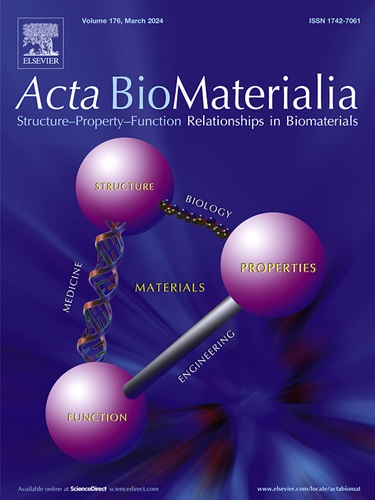Biodegradable Zn-xY alloys with enhanced osteogenesis and angiogenesis effects for bone implant applications
IF 9.6
1区 医学
Q1 ENGINEERING, BIOMEDICAL
引用次数: 0
Abstract
Biodegradable zinc-based alloys have gained significant attention in the biomedical field due to their favorable degradability, but challenges remain in enhancing their mechanical properties and biocompatibility. As promising candidates for bone implant materials, improving osteogenic differentiation, angiogenesis and antibacterial properties is crucial. In this study, Zinc-xYttrium (Zn-xY, x = 0.1, 0.6, 1.0 and 2.0 at.%) alloys were developed, and their mechanical properties, degradation behavior, cytocompatibility, osteogenic activity, angiogenic potential and antibacterial properties were systematically evaluated. Specifically, Zn-2.0Y exhibited the highest mechanical strength, with a tensile strength (UTS) of 230 MPa, yield strength (YS) of 170 MPa, and elongation at break (ER) of approximately 16%. In terms of degradation, Zn-2.0Y demonstrated the slowest degradation rate. Additionally, this alloy significantly enhanced osteogenic differentiation and mineralization of human bone marrow-derived mesenchymal stem cells (hBMSCs) and promoted migration and angiogenic activity in human umbilical vein endothelial cells (HUVECs). Moreover, this alloy demonstrated far better antibacterial properties than pure Zn. In vivo rat femoral implantation studies further confirmed that Zn-2.0Y promoted bone integration. Moreover, the study revealed and validated that Zn-2.0Y enhances osteogenic and angiogenic activities through the PI3K/AKT signaling pathway. These findings highlight Zn-2.0Y as a promising biodegradable material for bone implant applications.
Statement of significance
The development of advanced biodegradable bone implant materials is crucial for addressing complex challenges in bone repair. This study investigates Zinc-xYttrium (Zn-xY, x = 0.1, 0.6, 1.0 and 2.0 at.%) alloys, focusing on Zn-2.0Y, which exhibits tensile strength >230 MPa, yield strength ∼170 MPa, and elongation at break ∼16%. The degradation rate of Zn-xY alloys decreases with increasing Y content, with Zn-2.0Y showing the lowest rate of 45 µm/y. In vitro and in vivo studies demonstrate that Zn-2.0Y promotes osteogenesis and angiogenesis by activating the PI3K/AKT signaling pathway. These findings highlight Zn-2.0Y as a promising biodegradable material for bone repair.

生物可降解锌- xy合金在骨植入物中增强成骨和血管生成作用的应用。
生物可降解锌基合金因其良好的可降解性在生物医学领域备受关注,但在提高其力学性能和生物相容性方面仍存在挑战。作为有前途的骨植入材料,改善成骨分化、血管生成和抗菌性能至关重要。本研究制备了锌- xytrium (Zn-xY, x = 0.1、0.6、1.0和2.0 at.%)合金,并对其力学性能、降解行为、细胞相容性、成骨活性、血管生成潜能和抗菌性能进行了系统评价。其中,Zn-2.0Y具有最高的机械强度,抗拉强度(UTS)为230 MPa,屈服强度(YS)为170 MPa,断裂伸长率(ER)约为16%。在降解方面,Zn-2.0Y的降解速度最慢。此外,该合金还能显著增强人骨髓间充质干细胞(hBMSCs)的成骨分化和矿化,促进人脐静脉内皮细胞(HUVECs)的迁移和血管生成活性。此外,该合金表现出比纯锌更好的抗菌性能。大鼠体内股骨植入研究进一步证实Zn-2.0Y促进骨整合。此外,该研究揭示并验证了Zn-2.0Y通过PI3K/AKT信号通路增强成骨和血管生成活性。这些发现突出了锌-2.0 y是一种很有前途的骨植入生物降解材料。重要意义:发展先进的可生物降解骨植入材料对于解决骨再生和修复中的复杂挑战至关重要。本研究研究了zn - xytrium (Zn-xY, x = 0.1,0.6,1.0和2.0 at.%)合金,重点研究了Zn-2.0Y合金,其抗拉强度>230 MPa,屈服强度~ 170 MPa,断裂伸长率~ 16%。随着Y含量的增加,Zn-xY合金的降解率逐渐降低,其中Zn-2.0Y的降解率最低,为45µm/ Y。体外和体内研究表明,锌-2.0 y通过激活PI3K/AKT信号通路促进骨生成和血管生成,并具有体外抗菌特性。这些发现突出了锌-2.0 y作为一种有前途的骨修复生物降解材料,解决了关键的未满足的临床需求。
本文章由计算机程序翻译,如有差异,请以英文原文为准。
求助全文
约1分钟内获得全文
求助全文
来源期刊

Acta Biomaterialia
工程技术-材料科学:生物材料
CiteScore
16.80
自引率
3.10%
发文量
776
审稿时长
30 days
期刊介绍:
Acta Biomaterialia is a monthly peer-reviewed scientific journal published by Elsevier. The journal was established in January 2005. The editor-in-chief is W.R. Wagner (University of Pittsburgh). The journal covers research in biomaterials science, including the interrelationship of biomaterial structure and function from macroscale to nanoscale. Topical coverage includes biomedical and biocompatible materials.
 求助内容:
求助内容: 应助结果提醒方式:
应助结果提醒方式:


